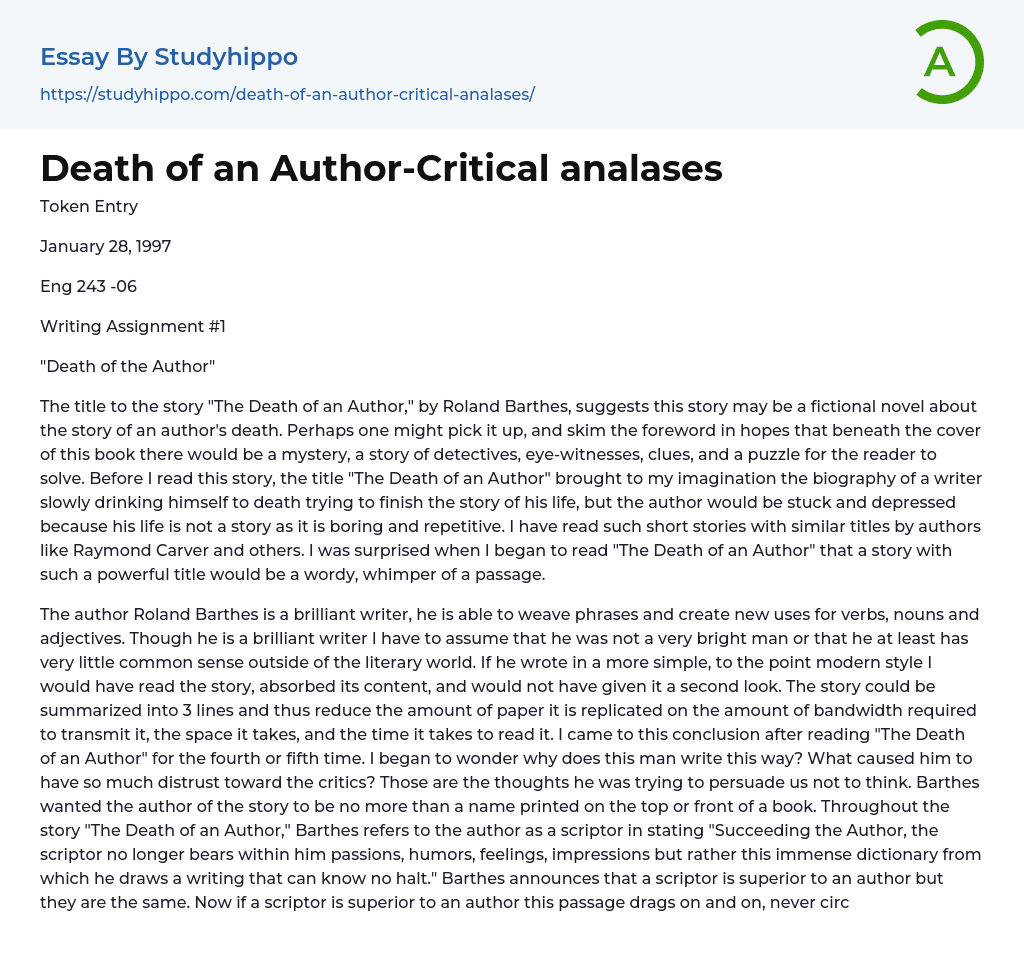The title to the story "The Death of an Author," by Roland Barthes, suggests this story may be a fictional novel about the story of an author's death. Perhaps one might pick it up, and skim the foreword in hopes that beneath the cover of this book there would be a mystery, a story of detectives, eye-witnesses, clues, and a puzzle for the reader to solve.
Before I read this story, the title "The Death of an Author" brought to my imagination the biography of a writer slowly drinking himself to death trying to finish the story of his life, but the author would be stuck and depressed because his life is not a story as it is boring and repetitive. I have read such short stories with similar titles by authors like Raymond Carver
...and others. I was surprised when I began to read "The Death of an Author" that a story with such a powerful title would be a wordy, whimper of a passage.
The author Roland Barthes is a brilliant writer, he is able to weave phrases and create new uses for verbs, nouns and adjectives. Though he is a brilliant writer I have to assume that he was not a very bright man or that he at least has very little common sense outside of the literary world. If he wrote in a more simple, to the point modern style I would have read the story, absorbed its content, and would not have given it a second look. The story could be summarized into 3 lines and thus reduce the amount of paper it is replicated on the amount of bandwidth required to
transmit it, the space it takes, and the time it takes to read it. I came to this conclusion after reading "The Death of an Author" for the fourth or fifth time.
I began to wonder why does this man write this way? What caused him to have so much distrust toward the critics? Those are the thoughts he was trying to persuade us not to think. Barthes wanted the author of the story to be no more than a name printed on the top or front of a book. Throughout the story "The Death of an Author," Barthes refers to the author as a scriptor in stating "Succeeding the Author, the scriptor no longer bears within him passions, humors, feelings, impressions but rather this immense dictionary from which he draws a writing that can know no halt." Barthes announces that a scriptor is superior to an author but they are the same.
Now if a scriptor is superior to an author this passage drags on and on, never circulating around a single point. A scriptor does not try to make art of the two-hundred and fifty-five symbols placed in front of him. A scriptor arranges the symbols in an order that once decoded can be read back and can convey whatever message the scriptor recorded. Barthes reveals his knowledge of this in writing, "Once the author is removed, the claim to decipher a text becomes quite futile. To give a text an Author is to impose a limit on that text, to furnish it with a final signified, to close the writing."
I believe that Barthes is truly an author. His style of writing, as demonstrated in
"The Death of an Author," is wordy and not clear and it invites self proclaimed critics and causal readers to try to read between the lines and to criticize Barthes himself. We rarely look at the writers who write in the magazine articles, newspapers, short stories that we read today. we read today magazine articles, newspapers, short stories. We do not read these items to gain the author's perspective on the subject.
We read them for our enjoyment, for the knowledge contained in them, or maybe so that by reading the story it will become a part of us and we will become a part of it. It is lines like "Though the sway of the Author remains powerful it goes without saying that certain writers have long since attempted to loosen it." How come Barthes is not one of these authors? Has Barthes made this critic situation worse? (If this situation bothers anyone but Barthes). Barthes' writing has a great overtone of irony because everyone who reads this will criticize the author and not the story.
- Boo Radley essays
- Genesis essays
- Richard iii essays
- Alice in Wonderland essays
- On the road essays
- Ozymandias essays
- The Nightingale essays
- Holden Caulfield essays
- Animal Farm essays
- 1984 essays
- A Hanging essays
- Shooting An Elephant essays
- A Tale Of Two Cities essays
- Adventures Of Huckleberry Finn essays
- Arthur Conan Doyle essays
- Brave New World essays
- Characters In Hamlet essays
- Characters In Romeo And Juliet essays
- Desdemona essays
- Diary Of A Wimpy Kid essays
- First-Person Narrative essays
- Frankenstein essays
- Heart Of Darkness essays
- Jane Eyre essays
- Jay Gatsby essays
- King Duncan essays
- Librarian essays
- Little Red Riding Hood essays
- Lord Of The Flies essays
- Silas Marner essays
- The Cask Of Amontillado essays
- The Catcher In The Rye essays
- The Crucible essays
- The Handmaid's Tale essays
- The Reader essays
- Virgil essays
- Wuthering Heights essays
- Candide essays
- Castle essays
- J. D. Salinger essays
- Ulysses essays
- Ethan Frome essays
- In Cold Blood essays
- Outliers essays
- Tuesdays With Morrie essays
- The Art of War essays
- Wife of Bath essays
- Huckleberry Finn essays
- The Lady With The Dog essays
- Great Expectations essays




